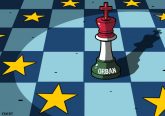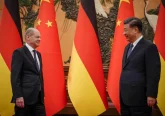The EU is not an end in itself. Europe needs a vision of functional integration orchestrated and managed not just by states, but also major regions, cities, NGOs and firms
Elections create winners and losers; the former suffer from hangover due to the excess of champagne; the latter suffer from hangover caused by depression. These last European elections have been a source of hangover for one additional reason: parties determined to curb EU powers came clearly on top in numerous countries. Yet, supporters of the current status-quo were quick to stress that they maintained a comfortable majority within the European Parliament. They sounded like people who had too much champagne. The political map of Europe has changed dramatically thanks to the triumph of the Eurosceptics. National leaders who are running the European project have been given bloody noses by the voters and the newly elected European Parliament has been declared illegitimate by a large segment of the electorate (including those who abstained). Italy seems to defy the common trend, maybe because they found a new young face to lead a firmly pro-European government.
The perverse results of not-so-European elections
Eurosceptic winners look like very different species, unlikely to live happily together; they do not even agree on the scope and method of disabling Europe and its Parliament. Eurosceptics want different things for Europe because their voters want different things from Europe. European elections are chiefly national rather than European spectacles and so the parties try to please their respective parochial voters. Bashing Muslims may win some votes for the Freedom Party in the Netherlands, but not for the Jobbik Party in Hungary; the latter prefers to target the Jews and Roma which in turn causes outrage in Holland. Syriza seduced Greek voters by demands to write off their country’s debts, but this is not what Euro-sceptic parties in Austria, Holland or Finland are happy to endorse.
This is how democracy is supposed to work within the EU: in the absence of a truly European demos we rely on the collective wisdom of 28 distinct national demoi. As the electoral campaign has shown, these distinct demoi have not only different cultures, but also different priorities and preoccupations. At present, the EU is clearly unable to square the circle and its democratic mechanism produces perverse results. In the EU’s South the key issue during the campaign was social hardship prompted by the austerity policy administered by the European Commission. In the EU’s East, the main issue was security prompted by the events in Ukraine manipulated by Vladimir Putin. In the EU’s North it was migration driven by xenophobic campaigns of Nigel Farage, Timo Soini or Geert Wilders. The electoral campaign in Germany appeared as though from another planet by comparison: the electoral discourse was politically correct with no anti-establishment parties offering a threat to Mrs. Merkel. EU austerity was declared a success, and Russia was still seen as a reliable economic partner. There was only one week when the candidates for the EP elections hotly debated the same ‘European’ issue: it was after Conchita Wurst won the Eurovision Song Contest.
High expectations, little room for manoeuvre
The EP’s electoral campaign has showed the issues the European publics really care about. Is the European Union, let alone its Parliament, well suited to addressing them? Social hardship in the South will not end unless the creditor states agree on a sizable transfer of resources to debtor states through a kind of Eurobonds and social transfers from the EU budget. The EU cannot order the group of so called ‘AAA’ states to show more solidarity with the debtor states. By now the EU has meaningful sanctions at its disposal to discipline debtor states, but no adequate incentives to help them turn around their economic fortunes.
The ‘hybrid war’ in Ukraine can hardly be tackled effectively by a ‘civilian power’ such as the EU. The painful lessons from the Yugoslav conflict should not be forgotten. The Union still does not speak with one voice on security matters, and the post-Balkan plans to have 60,000 soldiers at the EU’s disposal have long been forgotten. A common European energy policy (if created) could make Putin more cautious, but it will not deter Russian and Ukrainian extremists. The EU proved useful in post-conflict management and reconstruction, but should the coming years in Ukraine be about conflict and destruction, it will be unable to do much about them.
The EU is not well suited to tackle migration either. The European Parliament has repeatedly condemned manifestations of racism, but it has failed to tame the rise of populist anti-migrant politics. The European Commission has tried to defend the right of Europeans to move and seek labor within the EU, but its policy of handling the EU’s external borders has been a failure (as symbolized by the horrors of Lampedusa Island, for example.) The European Council is composed of politicians who fear that having a serious discussion about migrants will cost them their job. Most social hardship is caused by their misguided neoliberal economic policies, but migrants represent convenient scapegoats for low-paid labour and struggling public services.
Of course, the EU could be tailored to tackle the above mentioned problems, but nobody knows how. In the enlarged and multi-layered Union, bold reforms are contentious while timid ones are useless. Reforming the EU was difficult under much better weather conditions (remember the European Constitution?), and it is hard to expect any improvement under the bad weather conditions of today, especially in the East and South.
An EU unable to address the most crucial political and economic problems will become progressively irrelevant and marginalized. European leaders are reluctant to admit the EU’s failure, but they are not prepared to give the EU more powers or money. Behind the façade of European harmony we can observe a resurgence of power politics. Gone is equality among member states. New treaties are written with only some states in mind, external (arbitrary) interference in domestic affairs abounds; and policies are chiefly about punishment rather than help.
The twin illusions of Eurosceptics and Europhiles
Eurosceptics hope that the fall of the EU will bring power back to national capitals, while Europhiles fear that the fall of the EU will cause misery and conflict. Both groups are wrong. Eurosceptics tend to forget that integration ‘rescued nation-states‘ from powerful forces of globalization and high societal expectations. The EU was never as effective as it claimed to be, but it has helped its members generate growth through its single market and enlargement projects. With no EU to help or blame, nation states will find it more difficult to justify their shortcomings. Tapping into national sentiments is one thing; running complex economies and societies is another.
Contemporary Europe represents a highly integrated environment which requires adequate integrative solutions. Traditional forms of inter-state diplomacy are incapable of offering them. European firms can hardly function without some clear competition rules and institutions able to enforce them. Citizens demand effective means of protection from multinational firms or even from their own national-government, as is the case of Hungary at present. In short, the back to the future scenario of sovereign nation states fully in charge of their respective territory is not feasible.
Europhiles make a different kind of mistake: they see the EU as a synonym of integration. For them the demise of the EU implies the end of European integration and heralds the era of permanent conflict. However, we are already witnessing serious conflicts, and most of them have been generated by the EU and the Euro. Creditor and debtor states are head to head because the former imposed unworkable policies on the latter. There is a conflict between members of the Eurozone and those who are only members the Single market, because the former take decisions impacting on the latter without their consent. The new and poor member states argue continuously with the old and rich member states about the size and purpose of the EU budget. The EU and the Euro have also generated conflicts within member states as the ever growing number of citizens is unhappy with their leaders following instructions from Brussels.
Imagining new forms of integration
The last European elections were supposed to regain public trust in the European project. Have they? It is time to conclude that the current EU is hampering rather than fueling integration. It is also time to admit that the EU is unable to reform itself in any meaningful way. Enough is enough. Europe needs to think about alternative ways of making integration work for the benefit of its citizens and firms.
In my new book I spell out a vision of functional (rather than territorial) integration orchestrated and managed not just by states, but also major regions, cities, NGOs and firms. I employ the musical metaphor of polyphony to show that Europe’s parts can work in harmony without a bullish conductor from Berlin or Brussels. I do not claim the monopoly of wisdom, but I urge readers to consider some alternatives to the dysfunctional and unpopular EU. Those who brought us to the current mess insist that integration will die with less or no EU. Let’s prove them wrong!
This article originally appeared on the website of Policy Network. Policy Network debated The EU after the European Elections at a major conference on 5 June held in partnership with the European Commission Representation in the United Kingdomand hosted by Nomura.







No Comment